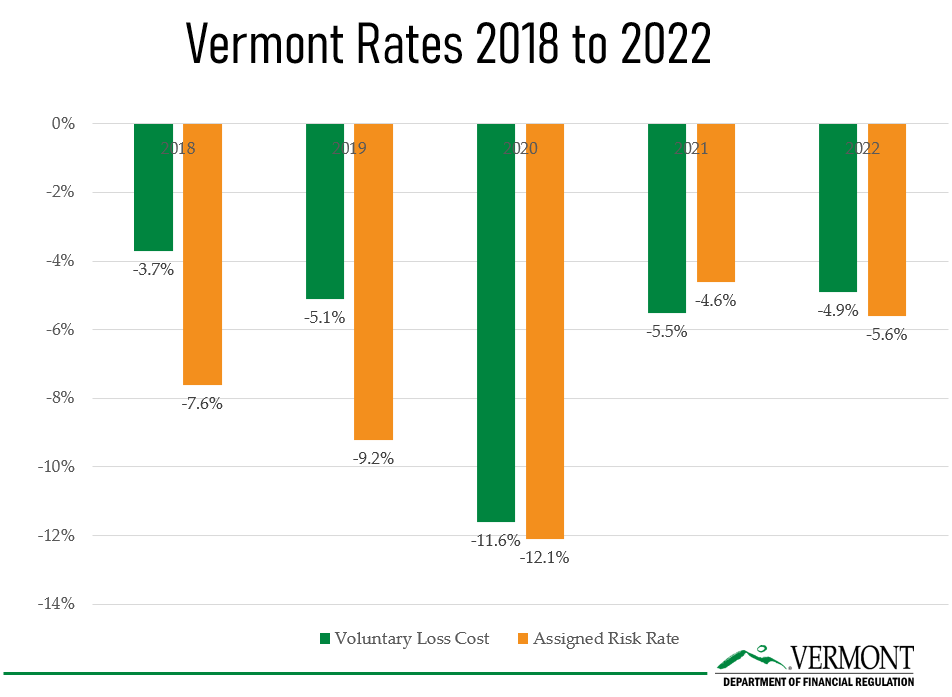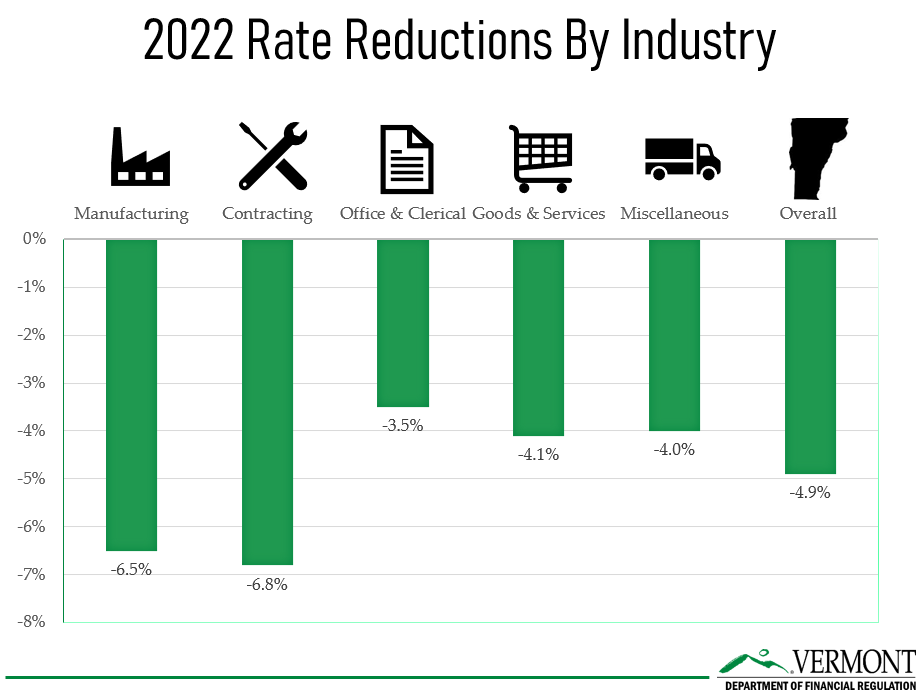Montpelier, Vt. – Governor Phil Scott and Department of Financial Regulation (DFR) Commissioner Michael Pieciak today announced that Vermont businesses will see another rate decrease in workers’ compensation insurance in 2022. This is the sixth straight year workers’ compensation rates have decreased, and when combined with decreases from 2017-2021, Vermont employers will pay an average of 41% less in premiums than they did in 2016.
The rate reduction will be effective on April 1, 2022, which is estimated to save Vermont employers over $8 million in premiums during the upcoming year.
“As we work to grow the economy and our workforce, addressing the high cost of doing business in Vermont is critical,” said Governor Scott. “A major expense for Vermont businesses has been workers’ compensation insurance, so I’m proud that we’ve been able to reduce these costs each year, without reducing benefits for workers. These savings will help Vermont employers of all sizes hire more workers, increase salaries and expand their operations in our state.”
“As Vermont businesses and workers face unparalleled challenges brought on by the COVID-19 pandemic, it is very encouraging to see that workplaces are continuing to become safer, which translates into lower workers’ compensation rate,” said DFR Commissioner Pieciak. “I applaud Vermont’s business community and the staff at the department for their work to make our workplaces safer and our state more affordable.”
The multi-year decreases reflect the continuing efforts of Vermont employers to maintain safe workplaces and a continued focus by the DFR to make workers compensation insurance more affordable to Vermont businesses.
Employers purchase workers compensation through one of two markets, the voluntary market and the assigned risk market. In the voluntary market — the open competitive market — loss costs will decrease by an average of 4.9%, which is the primary component of workers’ compensation rates. Approximately 90% of Vermont employers receive voluntary market coverage. In the assigned risk market — the market for employers unable to obtain coverage in the voluntary market — rates will decrease by an average of 5.6%. The continued rate relief in the assigned risk market is particularly good news for new businesses which are often required to obtain coverage through this market due to their lack of a claims history.
Here is a history of recent rate activity in Vermont for the voluntary and assigned risk markets:
|
Effective Date |
Loss Cost Change |
Assigned Risk Rate Change |
|
4/1/2017 |
-7.9% |
-8.0% |
|
4/1/2018 |
-3.7% |
-7.6% |
|
4/1/2019 |
-5.1% |
-9.2% |
|
4/1/2020 |
-11.6% |
-12.1% |
|
4/1/2021 |
-5.5% |
-4.6% |
|
4/1/2022 |
-4.9% |
-5.6% |
Rate changes vary by industry and classification. However, several key Vermont industries with historically high rates had significant decreases in 2020 and 2021, and most of these employers will see additional reductions in 2022. Vermont’s mechanized logging classes will see rate reductions of up to 16%, some sectors of the skiing industry will see rate reductions of 4-9%, and the dairy farming industry will see rate relief between about 7-9%.
The COVID-19 pandemic has significantly impacted all Vermonters including employers and businessowners. In 2020, DFR implemented rules that excluded COVID-19 related claims from the calculation of future premiums. This decision reflected the fact that COVID-19 claims do not provide a reliable measurement for predicting a safe workplace or future claim costs for an employer. Accordingly, the 2022 rates were developed without regard to COVID-19 related claims, eliminating any uncertainty of these claims on future workers’ compensation insurance costs for Vermont businesses.
The Governor and Commissioner Pieciak would like to recognize the diligent work of the Department of Financial Regulation team that oversees the rate approval process, including Deputy Commissioner Kevin Gaffney, Rosemary Raszka, Pat Murray and Jessica Sherpa.
###


